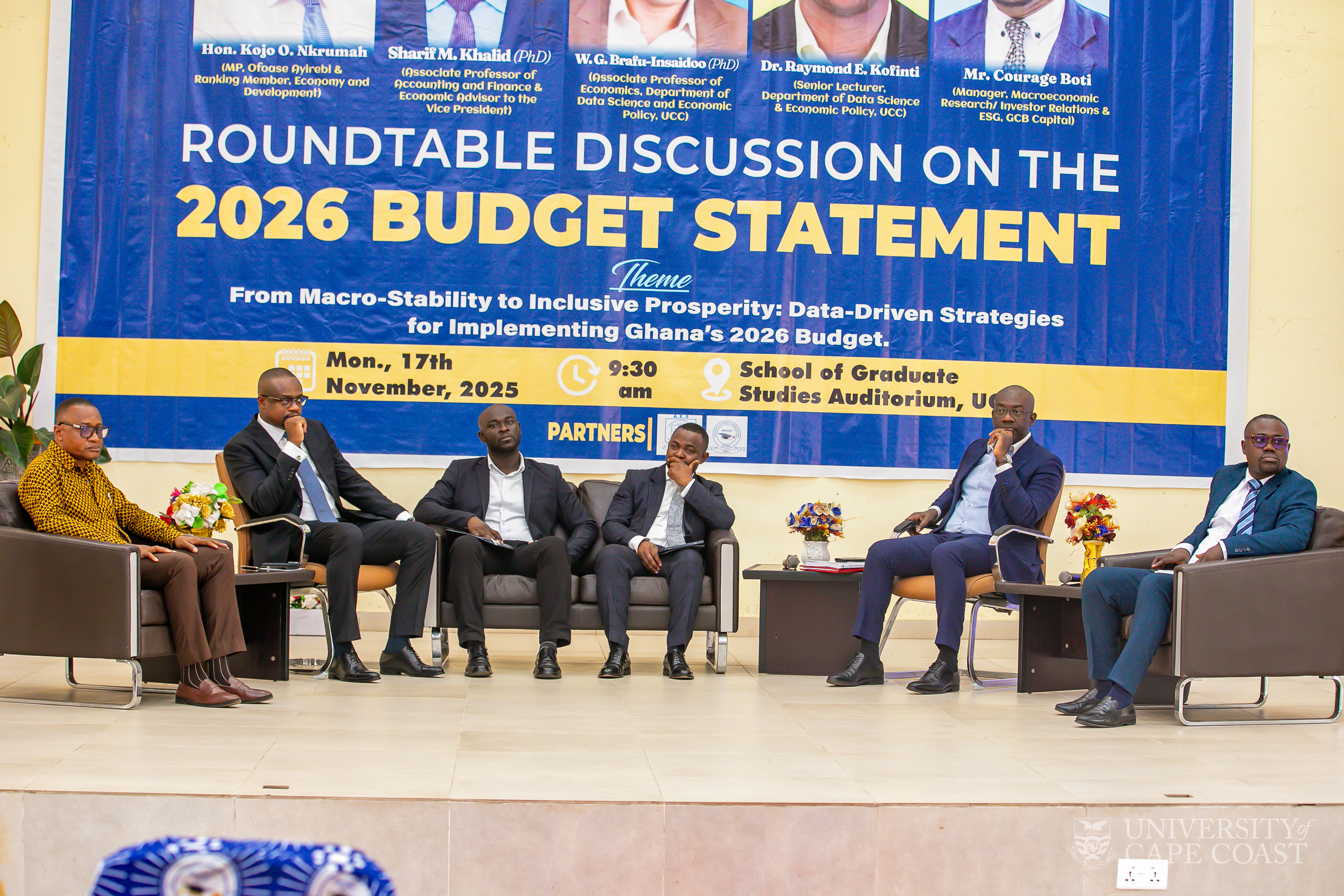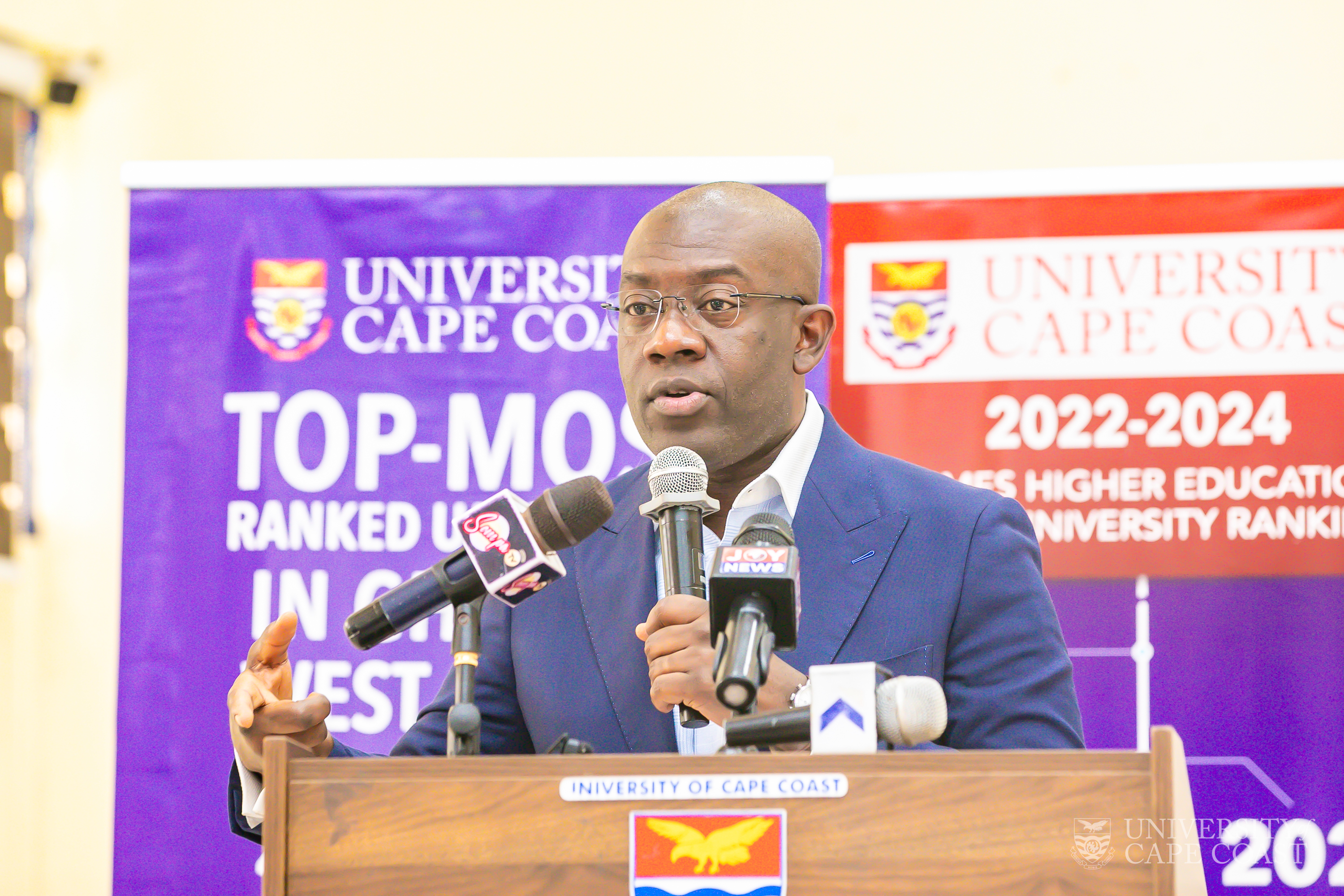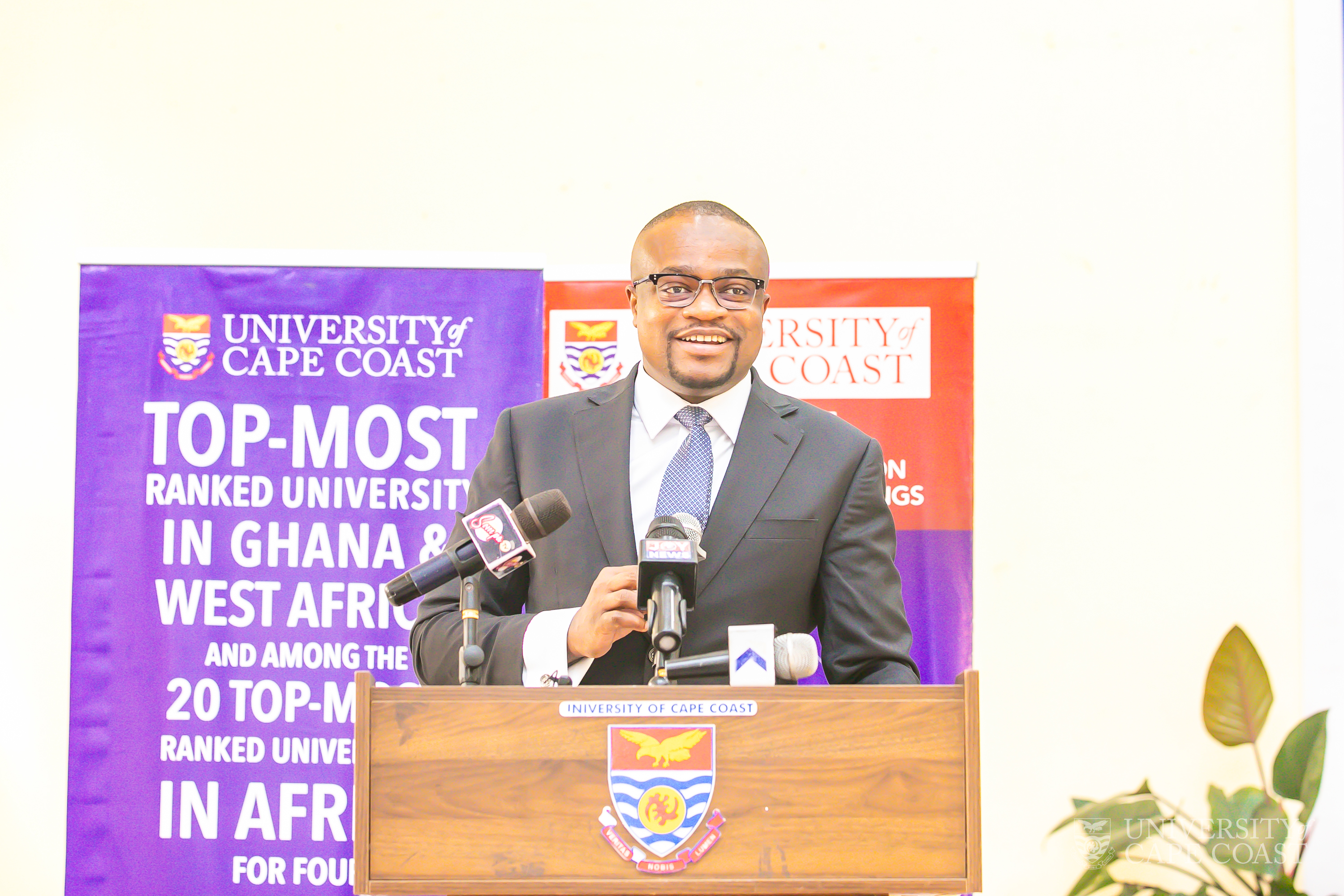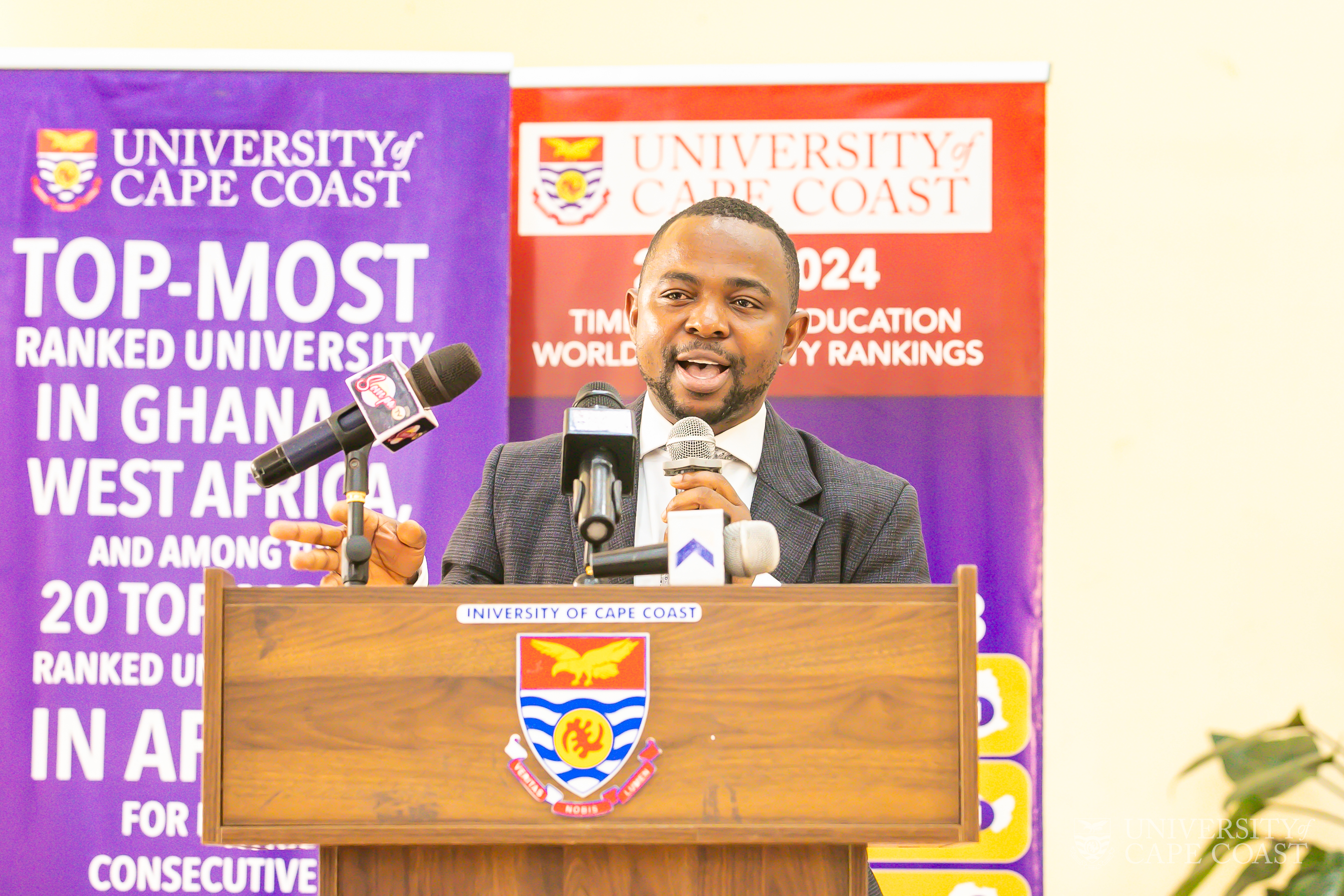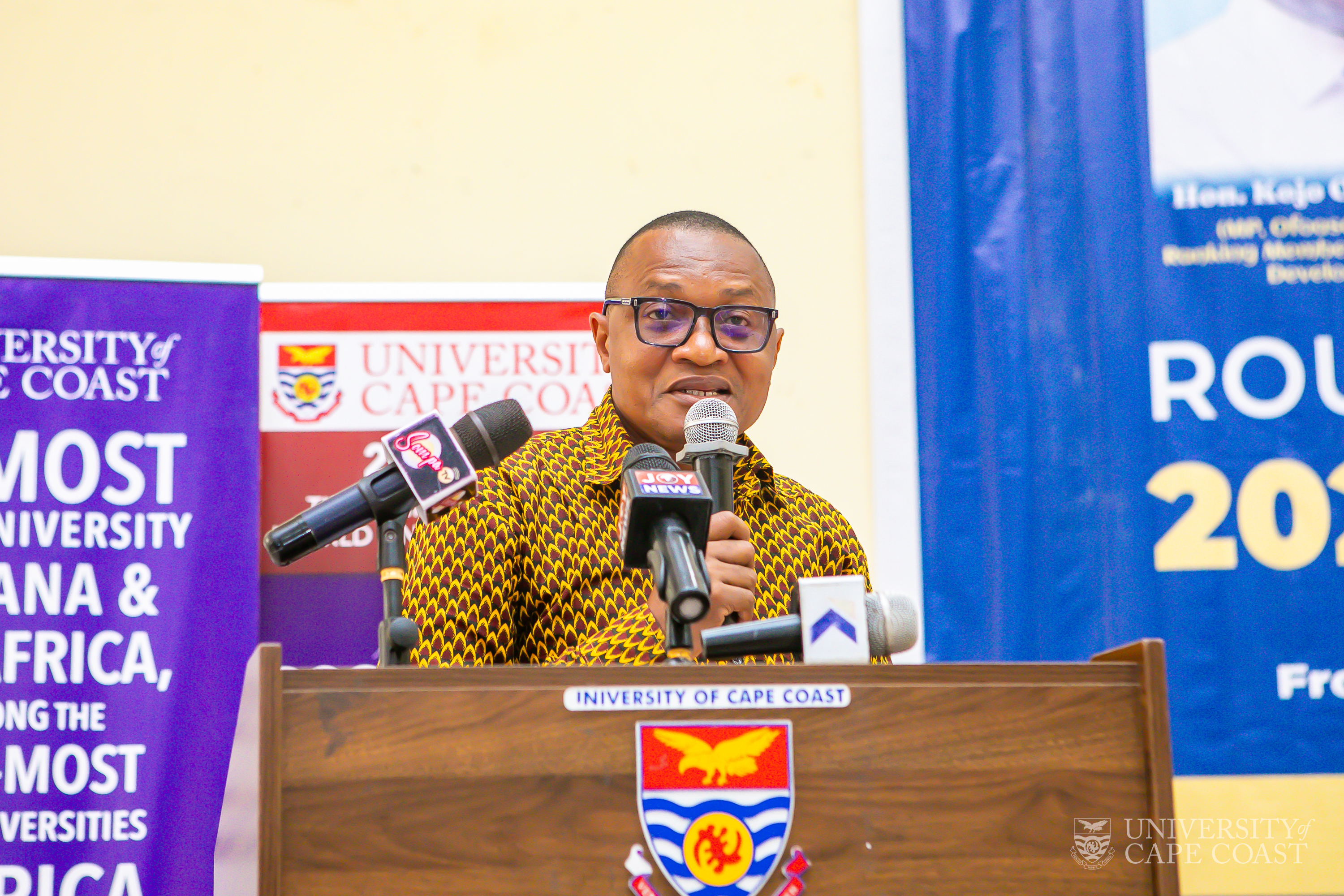In an effort to explain its implications for the Ghanaian people, the Department of Data Science and Economic Policy of the School of Economics, UCC, has held a roundtable discussion on the 2026 Budget statement at the School of Graduate Studies auditorium.
The presentation of the 2026 Budget Statement to Parliament on Thursday, November 13, 2025, by the Minister of Finance, Dr. Cassiel Ato Forson has so far attracted divergent reactions.
The discussants at the event
The programme was on the theme: “From Macro-Stability to Inclusive Prosperity: Data-Driven Strategies for Implementing Ghana’s 2026 Budget.”
It aimed at providing practical insights into how the fiscal policies outlined in the budget will impact enterprises and individuals across the economic spectrum.
The roundtable discussion brought together a distinguished panel of experts, including the Ranking Member of Parliament’s Economy and Development Committee, Hon. Kojo Oppong Nkrumah; the Economic Advisor to the Vice-President, Professor Sharif Mahmud Khalid; and the Manager of Macroeconomic Research at GCB Capital, Mr. Courage Boti.
The rest were Prof. William Brafu-Insaidoo and Dr. Raymond E. Kofinti, both from the School of Economics at UCC.
Insights from the discussions highlighted the Department's efforts toward contributing to national development.
Hon. Kojo Oppong Nkrumah
Speaking at the event, Mr. Kojo Oppong Nkrumah criticised the government for failing to submit programme documents on major national initiatives, including the 24-Hour Economy and the Big Push Infrastructural Plan, among others.
According to him, the government’s failure to present detailed documents on these flagship projects undermines parliamentary oversight and accountability.
Mr. Oppong Nkrumah said that, although the government lists these programmes in the national budget and allocates huge sums of money to them, Parliament and the public have not seen any clear plans showing how the initiatives would be implemented or monitored.
The Ofoase Ayirebi MP said it was worrying that millions of cedis were being disbursed for these projects even though there was no publicly available information on their goals, selection criteria, or performance indicators.
“Our job as Parliament is to examine the commitments and programmes and to scrutinise the budgets for each of them. Our job is to assess, make recommendations, and, in the end, approve the policy and the budget. So the programme documents need to come so that Parliament can properly perform its oversight role,” he stressed.
For his part, Professor Sharif Mahmud Khalid said Ghana was still in a period of economic stabilisation, but with encouraging signs.
“We haven’t exited the stability phase yet, but central bank reserves are strong, which is a good sign.”
One of the notable achievements so far, he noted, was the establishment of a functional Gold Board — fulfilling a major campaign promise.
Professor Sharif Mahmud Khalid said he was confident that the Budget Review would serve as a catalyst to restore domestic confidence and revitalise Ghana’s economy.
Professor Sharif Mahmud Khalid
He noted that key indicators such as the exchange rate and fiscal discipline had shown marked improvement.
“The cedi has stabilised significantly. Internal controls have been tightened, and government spending is being capped to create the financial space needed to implement strategic programmes.”
Prof. Khalid also reminded the public of the economic challenges inherited by the current government — including the blue-chip investments during the domestic debt exchange programme.
Prof. Khalid highlighted the government’s approach as a balancing act, pursuing transformational projects while ensuring financial discipline.
“We’re pushing big-ticket initiatives like the Women’s Development Bank and the 24-Hour Economy, but we’re doing so carefully, making sure the economy cools before we try to turn the corner.”
On the broader outlook, Prof. Khalid said Ghana was still in a period of economic stabilisation, but with encouraging signs.
“We haven’t exited the stability phase yet, but central bank reserves are strong, which is a good sign.”
A student asking a question during the event
One of the notable achievements so far, he noted, was the establishment of a functional Gold Board, fulfilling a major campaign promise.
“The Gold Board now has a fully constituted board and a legislative mandate. In the past, gold programmes were inconsistent. Now, we have structure, sustainability, and legal backing, which boosts both local and international investor confidence.”
He shared that international investors, including officials from the International Finance Corporation (IFC), were increasingly optimistic about Ghana’s prospects.
“I recently spoke with an IFC official at the Bank of Ghana. We agreed that investor confidence has returned. What we now need to build is strong domestic confidence.”
He continued: “We’re pushing big-ticket initiatives like the Women’s Development Bank and the 24-Hour Economy, but we’re doing so carefully, making sure the economy cools before we try to turn the corner.”
Prof. Khalid however said the budget was a bi-partisan document that was aimed at translating impact to growth.
Mr. Courage Boti
Taking his turn, Mr. Courage Boti urged the government to maintain a firm grip on expenditure to safeguard recent economic stability.He indicated that the government had made a good start in stabilising the macroeconomy.
“Exchange rates have calmed, inflation is slowing, and interest rates are showing some downward signals,” he added.
Despite the Public Financial Management System (PFMS) and the Fiscal Responsibility Act, he maintained that the real test would be how the government manages its spending in the coming year so that the recovery was not jeopardised and the economy was not thrown off gear.
Prof. William Brafu-Insaidoo
On his part, Prof. William Brafu-Insaidoo acknowledged ongoing debates about the budget’s ability to tackle economic challenges but maintained that it presents promising prospects.
He lauded Ghana’s policy framework credibility, noting the economy’s positive trajectory.
Prof. Brafu-Insaidoo stressed that macroeconomic management demands perpetual vigilance — balancing growth, inflation, and competitiveness is not episodic but continuous.
He added that credibility earned through sound policies must translate into tangible benefits for Ghanaians — job creation, poverty reduction, and inclusive growth.
He called for sustainable revenue mobilisation from Ghana's natural resources rather than relying heavily on taxation.
Dr. Raymond Elikplim
Also speaking at the event, Dr. Raymond Elikplim Kofinti expressed concern that the presentation of the budget lacked clear indicators for tracking poverty reduction and inequality.
He mentioned initiatives such as the National Apprenticeship Programme and the Integrated Oil Palm Development Programme (2026–2032), which were aimed at alleviating the plight of Ghanaians, but stressed that it was time for the government to leapfrog industry above agriculture.
“We have to leapfrog industry above agriculture to achieve meaningful growth,” he added.
He called for strengthened job creation by expanding the industrial sector and modernising agriculture in line with priorities on economic diversification and productivity.
“Gradual adjustment of overall social protection expenditure to 1.5% of GDP by 2028, and harnessing innovative data systems to track progress on poverty reduction and jobs,” he added.


